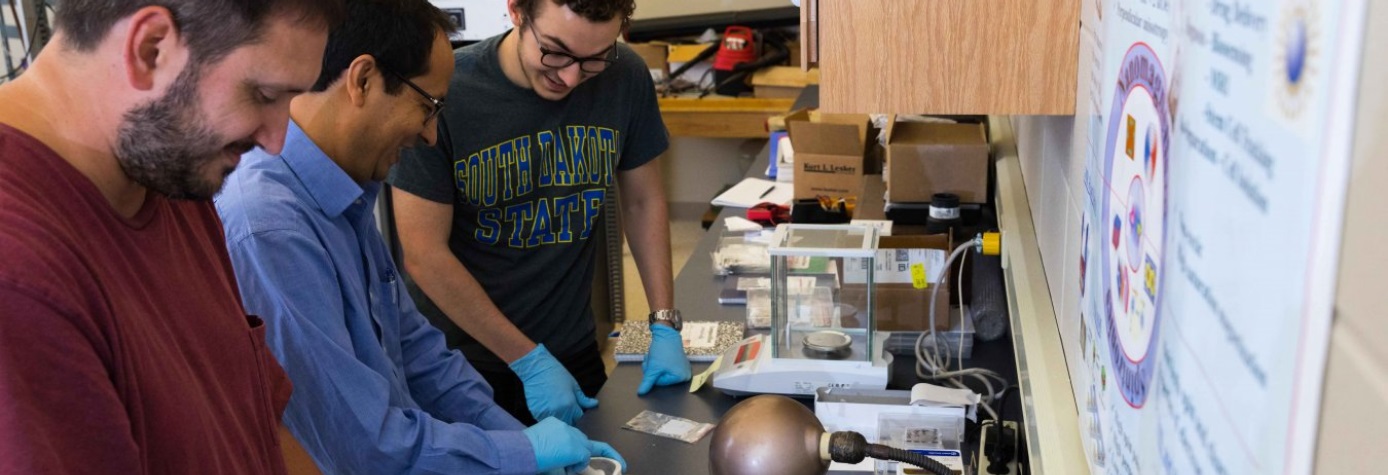|
|
|
Apr 27, 2024
|
|
2023-2024 Undergraduate Catalog
Physics (B.S.) - Science Teaching Specialization
|
|

 

Program Coordinator/Contact
Robert McTaggart, Assistant Department Head
Department of Chemistry, Biochemistry and Physics
Daktronics Engineering Hall 255
605-688-5428
Program Information
Physics is the foundation of almost all of the science and engineering disciplines. The curriculum in Physics has the flexibility to accommodate a wide range of student interests including engineering, physical science, mathematics, biological science, or health sciences. Graduates find careers in physics research, education, engineering, medicine, nuclear medicine, law, science journalism or alternatively many other choices.
Accreditation, Certification, and Licensure
Accreditation
Council for the Accreditation of Educator Preparation (CAEP)
South Dakota Department of Education
Certification and Licensure
- Completion of an approved bachelor’s Secondary preparation program.
- Completion of an approved South Dakota Indian studies course.
- Pass the state designated content knowledge test or 2.7 GPA in content major coursework.
- Pass the state designated pedagogy test.
- Completion of a Suicide Awareness and Prevention training, available free online through the South Dakota Department of Education.
- Apply online with the South Dakota Department of Education.
- Written recommendation from institution of higher education (SDSU) verifying program completion.
Course Delivery Format
Physics students learn through hands-on and face to face learning in lecture, laboratory, and field-based experiences.
|
Student Learning Outcomes
Upon completion of the Physics - Science Teaching Specialization, students will be able to:
- Support an environment that is inclusive to everyone regardless of race, ethnicity, gender, gender identity, sexual orientation, or disability status.
- Write a laboratory report that is appropriate for the discipline of physics and suitable for publication in an undergraduate research journal.
- Defend a hypothesis or a research project by giving an oral presentation in a colloquium setting.
- Solve complex physics problems by applying scientific and mathematical principles.
- Design experiments; build and use equipment; gather, analyze and interpret experimental data; and draw conclusions based upon the data.
- Propose creative solutions for key issues of scientific, social, economic, or environmental merit and defend their hypothesis in either a research paper or by generating a proposal for an experimental design.
Academic Requirements
- The program requires a cumulative GPA of 2.0 or above for all physics courses and a GPA 2.0 or above in PHYS 211-213 (or PHYS 111-113) and PHYS 331.
- A grade of “C” or better is required in CMST 101, ENGL 101, PSYC 101, and MATH 103 or higher (if these courses are in your plan of study), and all courses for the major (classes with department/program prefix).
- An overall GPA of 2.5 is required to enroll in any education courses.
Requirements for Physics Major - Science Teaching Specialization: 120 Credits
Bachelor of Science
System General Education Requirements
Department of Chemistry, Biochemistry and Physics Requirements
- Capstone course in the major discipline
- Upper division coursework Credits: 33
Major Requirements
- CHEM 112 - General Chemistry I (COM) [SGR #6, HSDC] Credits: 3
- CHEM 112L - General Chemistry I Lab (COM) [SGR #6, HSDC] Credits: 1
- CHEM 114 - General Chemistry II (COM) [SGR #6, HSDC] Credits: 3
- CHEM 114L - General Chemistry II Lab (COM) [SGR #6, HSDC] Credits: 1
- EE 216 - Linear Circuits I Credits: 3
- EE 216L - Linear Circuits I Lab Credits: 1
- MATH 125 - Calculus II (COM) [SGR #5, HSDC] Credits: 4
- MATH 225 - Calculus III (COM) [SGR #5, HSDC] Credits: 4
- MATH 321 - Differential Equations (COM) Credits: 3
- PHYS 119 - First Year Seminar in Physics (COM) Credits: 1
- PHYS 185 - Solar System Astronomy (COM) [SGR #6, HSDC] Credits: 2
and PHYS 185L - Solar System Astronomy Lab (COM) [SGR #6, HSDC] Credits: 1
or PHYS 187 - Stars, Galaxies, and Cosmology (COM) [SGR #6, HSDC] Credits: 2
and PHYS 187L - Stars, Galaxies, and Cosmology Lab (COM) [SGR #6, HSDC] Credits: 1 - PHYS 211 - University Physics I (COM) [SGR #6, HSDC] Credits: 4
- PHYS 211L - University Physics I Lab (COM) [SGR #6, HSDC] Credits: 1
- PHYS 213 - University Physics II (COM) [SGR #6, HSDC] Credits: 4
- PHYS 213L - University Physics II Lab (COM) [SGR #6, HSDC] Credits: 1
- PHYS 316 - Measurement Theory and Experiment Design Credits: 1
- PHYS 316L - Measurement Theory and Experiment Design Lab Credits: 1
- PHYS 331 - Introduction to Modern Physics (COM) Credits: 3
- PHYS 341 - Thermodynamics (COM) Credits: 2
- PHYS 343 - Statistical Physics (COM) Credits: 2
- PHYS 421 - Electromagnetism (COM) Credits: 4
- PHYS 437 - Foundations of Health Physics Credits: 3
- PHYS 451 - Classical Mechanics (COM) Credits: 4
Teaching Specialization Requirements
Electives
Taken as needed to complete any additional degree requirements.
Total Required Credits: 120
Summary of Program Requirements
Bachelor of Science
|
| System General Education Requirements* |
22 Credit Hours |
| Major Requirements |
57 Credit Hours |
| Teaching Specialization Requirements |
37 Credits Hours |
| Electives** |
4 Credit Hour |
*System General Education Requirements for students pursuing a baccalaureate degree shall include a minimum of 30 credit hours. Some general education coursework may be counted for Major Requirements and Supporting Coursework.
**Taken as needed to complete any additional degree requirements.
Academic Advising Guide Sheet
The goal of the academic advising guide sheets and sample plans of study is to promote undergraduate student success by guiding all students to timely completion of an undergraduate degree. Students are not limited to the course sequence provided for their academic program. Instead, the sample plan of study is one possible path to completing your degree and is meant to be used as a guide for planning purposes in consultation with an academic advisor. The plans also help students prepare for meetings with their academic advisor and track their progress in their selected academic program.
|
|
|
|
|
|